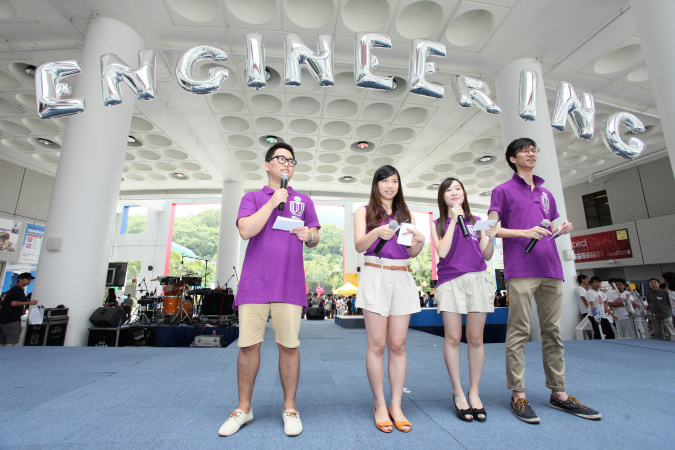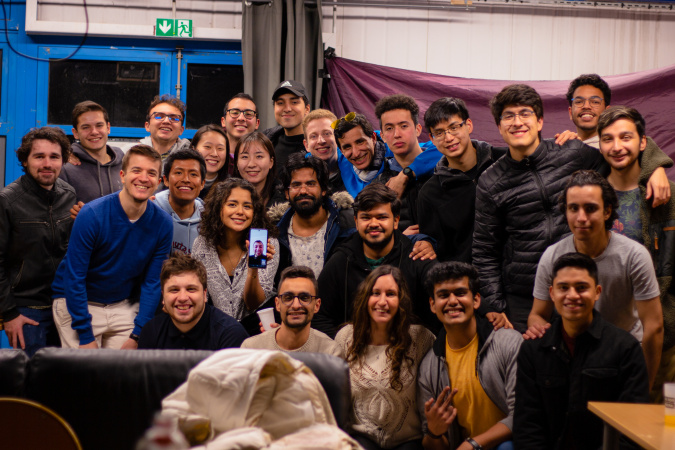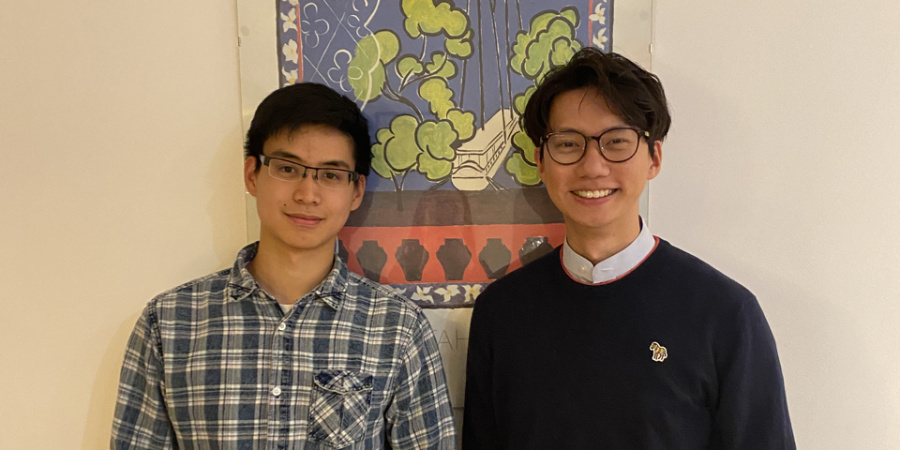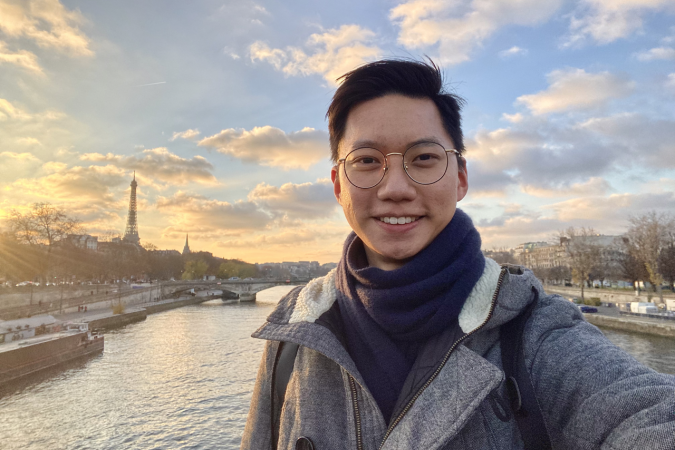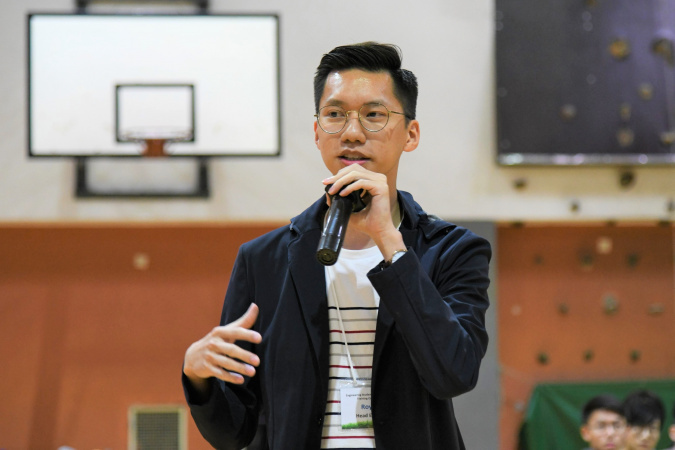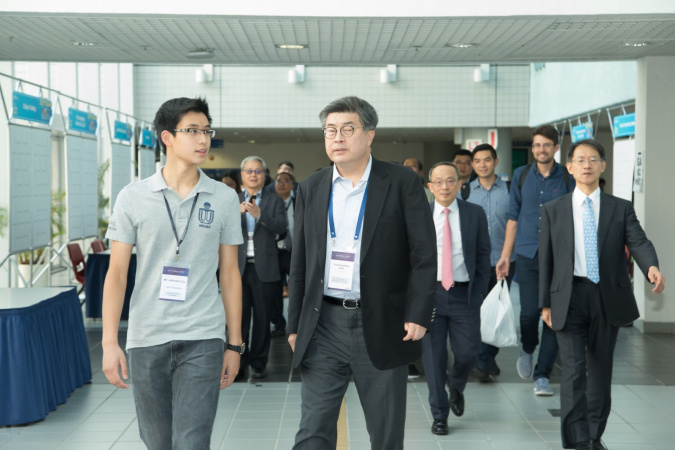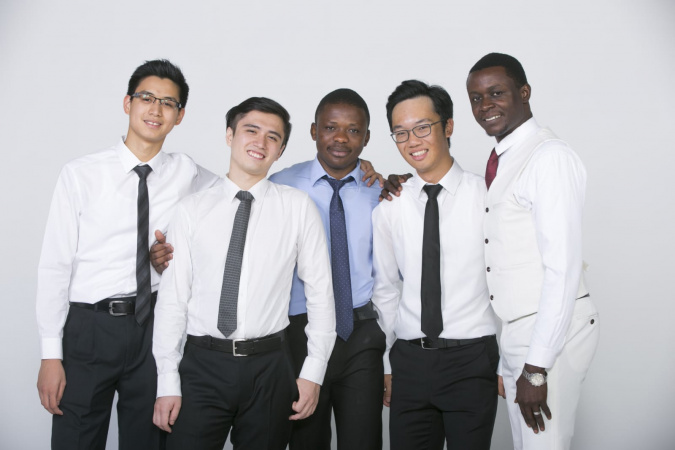Two HKUST Engineering Alumni Gained a Strong Foothold in France by Fully Immersing into Local Culture
France often brings to mind arts and culture, high fashion, cuisine, and beautiful architecture. However, HKUST School of Engineering alumni, Roy CHUNG (2013 BEng in Computer Science) and Johnson LIU (2021 BEng in Mechanical Engineering), also discover in France a path to their respective dream careers in user experience (UX) design and aeronautics. Laureates of the prestigious France Excellence Scholarship (formerly known as Alexandre Yersin Excellence Scholarship) awarded by the Consulate General of France in Hong Kong and Macau, they share the joys and challenges of their postgraduate studies in the European nation.
Johnson, a recent graduate, views the scholarship as an invaluable opportunity to pursue a cherished goal. “I majored in mechanical engineering for my degree at HKUST and I have always had a keen interest in aeronautics. France is one of the best destinations to build a career in aeronautics, given its strong industrial presence. When I became aware of the scholarship scheme, it felt like the right time to grab the opportunity.”
This has led Johnson to the Master-equivalent Diploma in Engineering (diplôme d’ingénieur) at the Ecole Centrale de Nantes. The intensive, fast-track program is tailored to the needs of international students who already hold a bachelor’s degree overseas. (Meanwhile, most students in France are admitted to these engineering schools after the “concours[1]”, which follows two years of “classe préparatoire aux grandes écoles” after their baccalauréat[2].)
The first year teaches a general engineering curriculum in English that spans from energetics to machine learning. In the second year, students in the program will go into a specialization and will have no difference from other “élève ingénieurs[3]”, taking courses with other students in French, thereby being fully integrated into the framework under which engineering students in the French grandes écoles[4] are trained. This provides Johnson an opportunity to receive an authentic French diploma in contrast to an international engineering Master’s, thus more in sync with the mainstream in the eyes of employers.
Meanwhile, Roy had already worked for several years in Hong Kong, Mainland, and Singapore in UX design in reputable companies like Microsoft, Alibaba, and DBS, where he was responsible for optimizing the design of software for enhancing customer experience. Setting to develop himself further upon gaining close to a decade of professional experience, he began looking for the next career breakthrough.
“As the industry is increasingly data-driven in decision making, data literacy would be greatly beneficial. I was pleasantly surprised to find that French institutions offer some of the world’s top programs in the area,” Roy says, explaining his decision to sign up for the Master of Science in Big Data and Business Analytics at the ESCP Business School, which operates a network of campuses across Europe, including Paris and Berlin.
Hit the ground running
Both alumni have been quick to overcome challenges – despite the obvious cultural and language barriers, and made substantial progress in their studies within a short time frame. Their stay in France was made the most convenient possible with the active assistance of the French government.
Roy needed to pick up a wide range of hard skills in programming languages, like Python, R, and SQL, that are essential for data analysis and machine learning. Other classes have broadened his horizons on how different industries perform and transform in the era of big data. “The comprehensive curriculum provided me with a sound foundation to further develop my career in France and Europe,” he says in appreciation.
Within the first semester of his studies, Roy won a hackathon to build a natural language processing (NLP) solution for a US-based company to analyze public sentiment. During the four-day project, his team studied the company’s background and gauged its pain points. By integrating his experience and the newly acquired skills, his team came up with a solid proposal to transform social media data into actionable insights.
“I sent a thank you note to the company, and the data analyst replied to express his appreciation of the practicality of our solution. I feel like I have gained a glimpse into the French business scene, and that I am able to make a real impact. This gave me a great sense of achievement and confirmed that I am heading in the right direction in my career,” says Roy.
Similarly, Johnson found himself on a steep learning curve when picking up technical skills, like C++ programming, database, data science, and machine learning. He has also got the opportunity to develop a comprehensive, analytical, and practical mindset in dealing with real-life engineering problems. “In comparison, students in Asia usually dig deep into a major. What is most valued in France is an engineer equipped with necessary skills in multiple domains, the so called “ingénieur généraliste”,” he elaborates.
With France being a world leader in the aeronautics industry and the home to Airbus and Safran, Johnson also notes that the curriculum is more aligned with industry practices. “I’ve built a solid knowledge foundation during my undergraduate studies at HKUST, and here in France, I got to understand more about the industry practices through case studies and seminars conducted by corporate partners, as well as understanding engineering concepts in a more mathematical approach. It gives me a stronger grasp of what I should know as a competent engineer. The compulsory internship program also ensures that I have sufficient career exposure by the time I graduate, preparing me to work as an engineer in the industry,” Johnson explains.
Life, the French way
Despite their busy academic schedule, they are both developing an appreciation for the French people’s way of life, which emphasizes quality over quantity. Inspired by this, Johnson has taken the time to learn horse riding, practice boxing, and join a choir. “I am also engaged in the international students club – but their committee meetings are conducted in French,” he says with a laugh, and goes on to note that students are more concerned about global issues. “In recent months, I can see signs and acts of support for Ukraine almost everywhere I go. Topics like climate change, racism, and gender equality are everywhere in life here.”
For Roy, the summer holiday presents a perfect opportunity for him to immerse himself in his personal interest. “I really admire the theater culture here. Attending the Festival d’Avignon, which is an annual festival of arts, has truly deepened my understanding and appreciation of the French arts and culture scene.”
Throwback to HKUST
Even when the two alumni continue making headway into life in France, they have taken the time to look back on some of the most treasured lessons they learned while serving as Heads of Engineering Student Ambassadors (ESA) during their studies at HKUST.
“The most I owe to the ESA program are my soft skills and interpersonal skills,” says Roy. “Building on my passion for computing and engineering, being an ESA helped me become more presentable and approachable. This empowered me to be more convincing when I share my ideas with others. This has been helpful throughout my career, and has really transformed the stereotypical image of the nerdy and individualistic engineer.”
For Johnson, being an ESA meant “not sticking to my own circle”. By aiding the School of Engineering in different events as an ESA, for example, talking to high school parents on Information Days, conducting personal sharing to high school students, and leading campus tours for overseas academics during the Asian Deans’ Forum 2018, he gained the essential tools needed to reach out and build connections with different people. “My communication skills have significantly improved through frequent practices. I’ve learned how to present myself in ways that best fit a circumstance, and I have become more skillful at adapting my speech when engaging in conversations with people of different ages and backgrounds.”
Meanwhile, Johnson believes that his days at HKUST have made him a tougher person, especially after the hectic time he had in his final year, working hard for his final year project with a 21-credit load. “To me, the important thing is that I have already proven myself through those tough but memorable times. I am confident that I would be able to cope with the challenges in the future, come what may.”
“HKUST has taught me to continuously adapt to new environments, bounce back from the lows, and transform myself to move forward in life. My advice to current students is to enrich your life experiences and expand your horizons, they will become a great source of creative inspiration in the years to come,” concludes Roy proudly.
[1] Concours is an entry exam to enter the higher education schools
[2] Baccalauréat is a diploma of secondary education
[3] Élève ingénieurs are engineering students
[4] Grandes écoles are elite French institutions of higher education for professional or technological training
